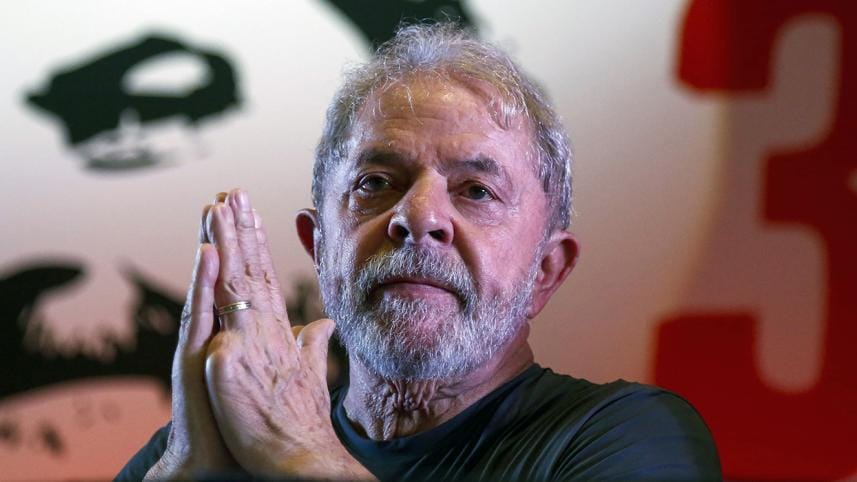Brazil's Lula: Once invincible leftist on brink of prison

A former shoeshine boy and steelworker who rose to become one of Brazil's most popular presidents, Luiz Inacio Lula da Silva's downfall has been just as dramatic.
At 72, the lifelong fighter finds himself on the ropes following a Supreme Court ruling that could see him soon sent to prison.
The two-term former president was sentenced in January to 12 years for taking a bribe.
But, with a stunning lead in polls ahead of October 7 presidential elections, Lula hoped the Supreme Court would let him stay free while he pursued more appeals and sought a third term in office.
By a narrow majority, the justices voted to deny him, making it likely that Lula will now end up behind bars, not the presidential palace.
It's a dizzying descent for a man who ruled from 2003 to 2010 and left office with popularity ratings of 80 percent.
He was feted as a rare leftist who'd not only helped lift tens of millions of people from poverty but charmed the markets, putting Brazil on track to claim its mantle of emerging economic powerhouse.
However, things went sour shortly after he handed over to his chosen Workers' Party successor, Dilma Rousseff, who oversaw a rapidly declining economy and in 2016 was forced out of office in an impeachment vote.
The post-Lula era also saw prosecutors open a mammoth corruption probe called "Car Wash" that revealed systemic embezzlement and bribery among scores of individual politicians, all the main political parties, and many of the biggest businesses.
Before long, the prosecutors homed in on Lula too and, despite his insistence that he is the victim of a politicized judiciary, they got their conviction.
Street vendor, party founder
Lula grew up in deep poverty, the last of eight children born to a family of farmers in the arid, hardscrabble northeastern state of Pernambuco.
He had little formal education as a boy, quitting grade school to help his family get by.
When he was seven, his family joined a wave of migration to the industrial heartland of Sao Paulo state, where he worked as a shoeshine boy and street vendor before becoming a metalworker.
He rose to become president of his trade union less than a decade after joining.
He was the force behind big strikes in the 1970s that challenged the military regime. And in 1980, he co-founded the Workers' Party, first standing as its candidate for president nine years later.
He made three unsuccessful presidential bids from 1989 to 1998, each time chipping away at the establishment parties and the idea that a poor, uneducated labor leader could never be president of Brazil.
The fourth time, in 2002, he succeeded, taking office on January 1, 2003.
'Rock star' president
Lula calmed market fears of a radical surge to the left by adopting fiscally responsible policies and a calm, pragmatic approach.
He also had the good fortune to preside over a so-called golden decade for Latin America, when China's ravenous demand for raw materials propelled the region's economies to a historic period of growth.
Brazil's economy hit an impressive 7.5 percent growth pace in 2010, his final year in office.
Despite a series of scandals in his first term -- most notably a congressional vote-buying case that felled his chief of staff -- Lula coasted to re-election in 2006.
Brazil's first democratically elected leftist since the end of the 1964-1985 military dictatorship, he was so widely admired as president that Foreign Policy magazine called him a "rock star." His US counterpart Barack Obama once referred to him as "the man."
The constitution limited him to two consecutive terms, but he cemented his legacy by helping Rousseff into power.
Divider in chief
Post-presidential life proved fraught. In October 2011 he was diagnosed with cancer of the larynx and successfully underwent chemotherapy.
Despite the scandals, Lula remains the highest polling candidate by far for October's election. However, his negatives are also sky high, inspiring as much hatred as fervent admiration.
When his wife Marisa Leticia Lula da Silva died in February after a stroke, allies of the ex-president claimed that "persecution" by corruption prosecutors had contributed to her death.
Immediately, opponents accused Lula of using the personal tragedy to boost his image. Even personal tragedy had become politics.



 For all latest news, follow The Daily Star's Google News channel.
For all latest news, follow The Daily Star's Google News channel.
Comments